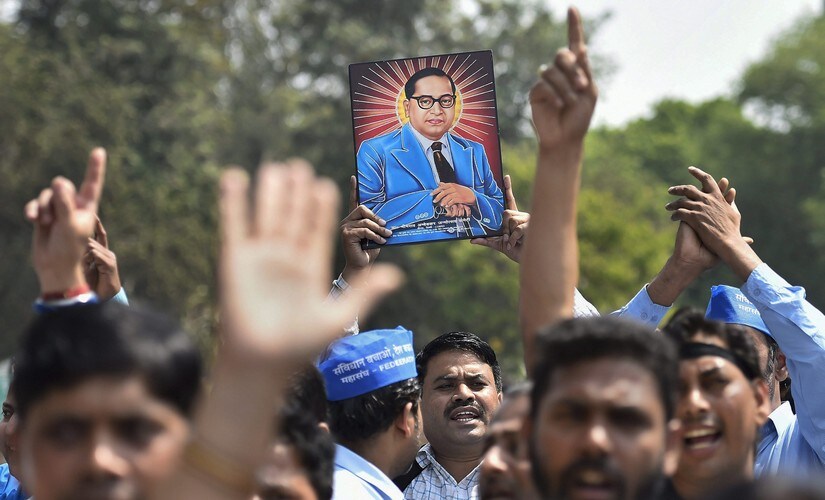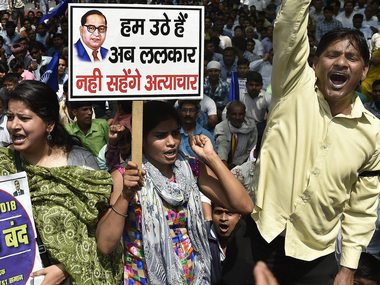It is very unlikely that Prime Minister Narendra Modi will succeed in reversing or checking the growing alienation of Dalits from Bharatiya Janata Party. Of this alienation, the most palpable evidence was the surprisingly successful Bharat Bandh that the Dalits recently organised to protest against the dilution of the Scheduled Castes and Scheduled Tribes (Prevention of Atrocities) Act, 1989. To ensure that the existing caste chasm does not widen, Modi has given a call for celebrating the birth anniversary of Dr BR Ambedkar on 14 April with unprecedented fervour. A day before, he is slated to dedicate the new Ambedkar memorial at Delhi’s 26, Alipur Road to the nation. In what has increasingly become his signature style, Modi wants BJP MPs to spend at least two nights in Dalit-dominated villages between 14 April and 5 May. These initiatives are typical of BJP’s Dalit policy since 2014 — lavish praise on Ambedkar; ask its leaders to have meals at Dalit houses; repeatedly cite statistics to show that the party won maximum number of reserved constituencies in 2014; promise, as BJP president Amit Shah recently did, that reservation will never be discontinued; co-opt Dalit leaders such as Ram Vilas Paswan and Ramdas Athawale and allow them scope to articulate the concerns of Dalits without being critical of Hindutva. [caption id=“attachment_4422665” align=“alignnone” width=“825”] File image of BJP president Amit Shah having lunch at a Dalit house. Image courtesy: Twitter@AmitShah[/caption] Modi’s strategy echoes Gandhi’s campaign against untouchability. Like Gandhi, he does not wish to reconfigure the economic basis of caste. But his outreach to Dalits lacks elements of radicalism of Gandhi’s programme — for instance, BJP leaders will not be found cleaning latrines or leading Dalits into those temples where discriminatory practices are still followed. Inter-dining and overnight stay with a Dalit were powerful, meaningful tropes decades ago, certainly not now. From this perspective, Modi’s measures infantilise Dalits. He presumes they are still stuck in the past and will feel assured and charmed at having a BJP leader spend a night or two in their village and break bread with them. No doubt, Dalits rail against the purity-pollution principle to which many still subscribe; they rage against the atrocities committed on them; they desire equality of treatment and opportunity. They are deeply offended at a mere suspicion that someone would not drink water from the glass they offer to him or her. But Dalits also realise that social status is a function of the economic and political power. After decades of social reform and rhetoric of caste equality, they know they will continue to endure oppression and deprivation until they control the levers of power, from the Centre to the state, to the panchayat. Until then, they cannot work laws enacted to protect as well as privilege them. It is precisely also why Dalits seek to combine and assert themselves against the brazen infringement of their rights, at times meeting violence by violence. This subaltern consciousness is not reflected in the BJP and Modi’s Dalit outreach. Their appeal is to the Dalits of the past, whose number is fast dwindling. They recoil from today’s Dalits and their rising aspirations. In their social policies is the message: as long as Dalits remain submissive and do not question the unequal social order, they are welcome in the BJP tent. They will be assigned a place, not in the front row — there is just one BJP Dalit in the Cabinet — but certainly in the rows at back. [caption id=“attachment_4422669” align=“alignnone” width=“825”]
 File image of members of Dalit community raise slogans during ‘Bharat Bandh’ in New Delhi. PTI[/caption]
File image of members of Dalit community raise slogans during ‘Bharat Bandh’ in New Delhi. PTI[/caption]
The BJP’s Dalit policy is not an outcome of its ignorance of the new social reality. It’s impossible for a party boasting such a formidable grassroots connect. Yet its outreach is circumscribed because of its diverse social base — it cannot alienate the upper castes, the party’s mainstay and its most enduring supporters, by adopting a radical Dalit policy. Those more than equal than others are mostly inclined to favour inequality.
This contradiction has come to the fore, in many ways, over the Scheduled Castes and Scheduled Tribes (Prevention of Atrocities) Act. For one, the government seemed to have deliberately looked the other way when the Supreme Court was hearing Subhash K Mahajan vs State of Maharashtra.
Amarendra Sharan, amicus curiae in the case, accused the government of agreeing that “anticipatory bail could be given in case there is no prima facie case being made out under the SC/ST (POA) Act”. Sharan also said that it was the additional solicitor general who supplied data to show that the SC/ST Act was misused.
Either the prime minister was oblivious of the stance his legal officers took in the court, a possibility hard to contemplate given Modi’s control over his ministry, or there was a definite political purpose behind it. The prevailing political conditions are such that the latter seemed to have been the principal driver. Last year, Maharashtra was agog with the Marathas taking out silent marches to demand reservation for themselves and abrogation of the SC/ST (POA) Act. Marathas constitute around 30 percent of the state’s population and are also economically powerful. BJP desperately needs their votes in Maharashtra, which sends 48 members to the Lok Sabha. It is a state crucial for Modi’s quest to win another innings in power. Maharashtra apart, the Dalit assertion has been a sore point with the upper castes and sections of the Other Backward Classes in Uttar Pradesh as well.
Last year, the Rajputs and Dalits clashed in Saharanpur, leading to the arrest of Bheem Sena chief Chandrashekhar Azad Ravana, who still languishes in jail under the National Security Act. In the same year, when Uttar Pradesh chief minister Yogi Adityanath visited a Dalit colony in Meerut, he was asked by residents to first pay his respect at BR Ambedkar statue in the nearby park. He did not heed their counsel and was roundly booed.
Uttar Pradesh’s caste cauldron has always been on simmer. But it bubbled over the SC/ST (POA) Act, prompting four Dalit MPs of BJP from Uttar Pradesh to speak out against Modi or Adityanath governments. [caption id=“attachment_4422673” align=“alignnone” width=“825”] Smoke billows out of burning cars during ‘Bharat Bandh’ against the alleged ‘dilution’ of Scheduled Castes/Scheduled Tribes act, in Uttar Pradesh’s Muzzaffarnagar. PTI[/caption] Bahraich’s MP, Savitri Bai Phule, was critical of BJP speaking in forked tongue on reservation. Robertsganj MP Chhote Lal Kharwar wrote a letter to Modi accusing Adityanath of scolding and throwing him out when he had gone to him with his grievance. Kharwar’s crib was that his younger brother had been replaced as block president by upper caste BJP leaders who helped a Samajwadi Party-Bahujan Samaj Party candidate to take the post. BJP MP from Nagina, Yashwant Singh, too, wrote a letter to Modi complaining that his abilities have not been utilised only because he is a Dalit. Singh has also demanded reservation in the private sector. The Dalit MP from Etawah, Ashok Kumar Dohre, has written a letter to the prime minister pointing out that the Uttar Pradesh police are targeting Dalits following the violence witnessed during the Bharat Bandh. Dohre’s charge has credence. For instance, in Meerut, someone put out a list of 83 Dalit “vandals and arsonists” on WhatsApp groups. But for one person, all those named went into hiding. The one who did not was shot dead by a group comprising Gujjars and a Rajput. Rakesh Sinha, a prominent RSS face on television, was picked up outside a TV channel office. The Uttar Pradesh Police mistook him for a Dalit guest who too had been invited to the studio.
It testifies to the Uttar Pradesh government’s credo — a good Dalit is one who keeps mum, who is not visible.
Indeed, if Dalits stunned the nation by organising an all-India bandh, no less surprising was the spontaneous consolidation of the upper castes against it. They attacked Dalits and fired upon them. In Rajasthan’s Hinduan city, mobs burnt down the house of BJP MLA, Rajkumari Jatav. Caste affinity trumped party loyalty. They also set fire to the house of former Congress MLA Bharosi Lal Jatav. In Madhya Pradesh’s Bhind district, Thakurs shot dead a protesting Dalit youth, as they did another in Gwalior. These incidents of last week underline why Modi’s Dalit outreach is not likely to succeed.
Social groups gravitate towards a party not only because of what its leaders profess; they also judge how accommodating or supportive its core supporters are of them. The BJP’s upper caste supporters rarely refrain from displaying their disdain for reservation. They have also traditionally suppressed Dalits. The incidents of last week will only bolster this impression.
Impact Shorts
More ShortsIt is not that the alienation of Dalits will necessarily prove disastrous to BJP. In Rajasthan, BJP is clearly on the backfoot. In Madhya Pradesh, the party has been in power for just too long as not to spawn discontent. In Uttar Pradesh, BJP can’t hope to repeat 2014 in 2019, more so as there is a distinct possibility of Samajwadi Party and Bahujan Samaj Party forging an alliance. In all these three states, BJP has to depend on the solid support of upper castes to fight a good battle. [caption id=“attachment_4422667” align=“alignnone” width=“825”] File image of members of Dalit community raise slogans during ‘Bharat Bandh’ in New Delhi. PTI[/caption] The conflict over the SC/ST (POA) Act has certainly consolidated the upper castes. They might not feel inclined to Congress as it is historically more of a Dalit-friendly party than BJP. For instance, it has mocked BJP for playing a duplicitous game — not taking a position against the dilution of the Act and then filing a review petition.
But the upper castes and the Marathas will think BJP at least tried to water down the SC/ST (POA) Act, which will remain diluted until the Supreme Court pronounces its judgment on the review petition. They will also feel that the review petition was filed because all other formations ganged up to mount pressure on BJP to file it.
Another reason why BJP filed a review application was to ensure that the caste conflict did not intensify and persist. Prolonged instability speaks of the government’s incapacity and alienates even supporters whose livelihoods are unaffected. Then again, with parties forging alliances, it cannot alienate Dalits to the degree it has done with the Muslims. It would mean entering the political area with a minus of 25 percent to 28 percent of votes. Modi’s Dalit initiatives hope to retain a fraction of the community’s votes it polled in 2014, not by empowering them or by changing the economic base of caste, but by assuming that there are many who remain what they were, say, 40-50 years ago — a people who silently licked their wounds and did not raise their voice to assert their rights, who became visible only when they were killed. Since it is usually impossible to turn the clock back, Modi’s Dalit outreach will unlikely succeed. You can’t always run with the hare and hunt with the hound.


)

)
)
)
)
)
)
)
)



